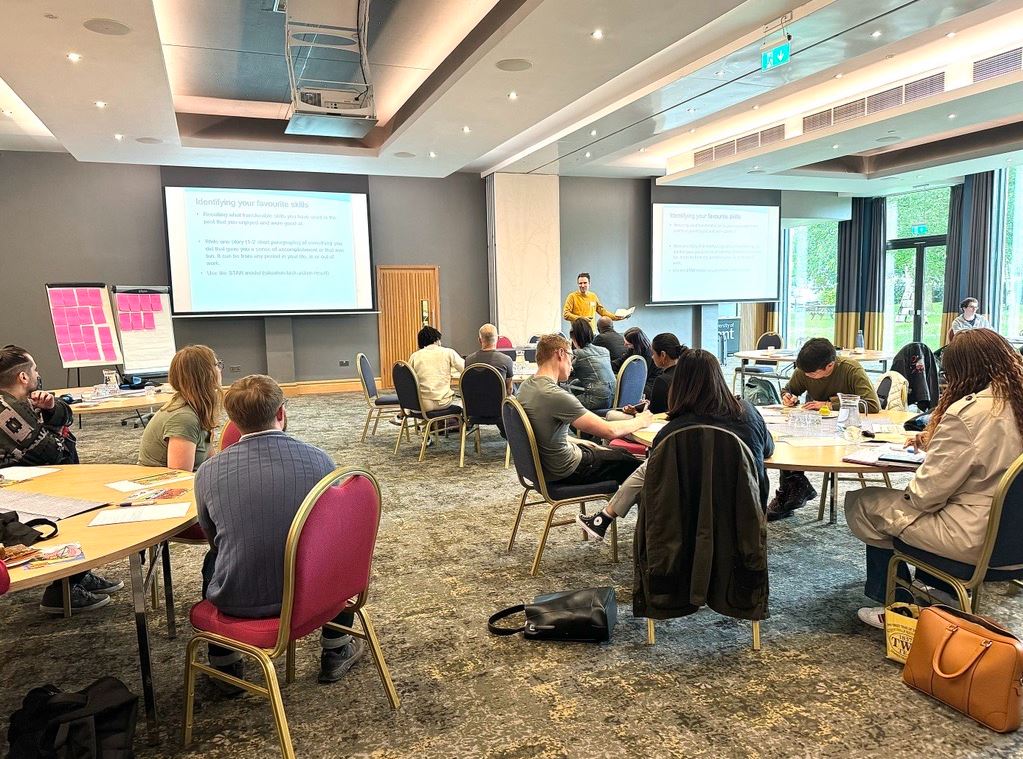“You are not alone!”
This is the message of solidarity and shared experiences that resonated with me during the two-day ‘Career Beyond Academia Retreat’ organised by Graduate Researcher College.
Every day, we start with a blank page and aim to fill it with our opinions, findings, and analyses. Hidden behind our screens, we type away a million words. ‘Scroll and click’, ‘copy and paste’, and ‘delete and undo’ are our best friends. A PhD journey is a solo journey, with researchers facing their anxieties, doubts, and reflections in isolation. As we reach the end of this journey, we find ourselves pondering the following steps while navigating the complexities of our current state.
As researchers, we are taught to question the status quo, appreciate the knowledge, distil information into meaningful insights and produce something coherent, applicable or valuable. However, in the process, we often forget to balance the needs of our research with those of ours. The retreat helped bring focus back to our strengths and skills by providing a safe space to self-reflect as a group and encourage each other. It focused on two main aspects: the ability to identify our skills (direct and indirect) and how to articulate them effectively in our CVs and cover letters.
The retreat helped bring focus back to our strengths and skills by providing a safe space to self-reflect as a group and encourage each other.
Starting with an energising group exercise, we quickly got to know each other in the room and formed a strong sense of group. From understanding the skills we’ve accumulated during our PhD to learning to voice our career aspirations clearly, the first day was spent translating our research-specific knowledge into industry-relevant essential skills. With interactive exercises that fostered group collaboration and communication, we discussed common topics like procrastination, self-worth and goals. My biggest takeaway from the day was acknowledging my accomplishment as a PhD researcher, documented in the form of a short story, and the five values I cherish (using an individual card-sorting exercise). Though seemingly simple, these small tasks, separate from research activities, were fundamental to the day as they provided an objective perspective of our individual experiences and visions. The individual CV review sessions (I had a revelation!) and pizza dinner were the cherry on top of the exceptional first day.
Having had much to think about and reflect on from the first day, the Yoga session to start the second day was a great way to calm our busy minds ahead of another action-packed day. While the first day had been about identifying our vision, objectives, and values (regarding the next steps and in general), the second day was about working on actionable steps to achieve these goals. The main aim was to tackle the omnipresent question we all felt: how do our previous experience/ education and current PhD skills combine to respond to a job application/ description? Often, while working solely on one (PhD) project for an extended period, we become short-sighted and focus on the immediate actions and skills we’ve utilised to produce our thesis. However, gathering evidence of our skills across the timeline (using prompts provided by the facilitator), discussing it with our peers and then using the STAR method to craft our success stories to add to our CVs or cover letters shed a different light on our skills and achievements.
Although, as PhD students, we might sometimes struggle to negotiate or use influence in communication and interaction, we are also resilient and self-motivated (mostly!). The three “Get Ready for Job” stations, that is, LinkedIn, CV, and networking station, helped us understand this and articulate it in industry-friendly language. With a “how-to” for an active LinkedIn profile, practical examples of CV responses to job descriptions and tips for ‘staying in touch’ (networking), I felt more equipped to tackle my job application process. My biggest learning that day was that I’m not a PhD student but a PhD researcher with experience.
As the day ended, I left the room feeling a bit more confident about myself, connected with others, and generally positive.
Whether I move beyond academia or stay within this realm, the retreat helped me understand what values drive me and, thus, what work would bring the most meaning to me.
I know this is said often but equally often forgotten, “Do the Job you want to!” and that is what the retreat helped me remember.
Goodbye for now. But let’s stay in touch!
